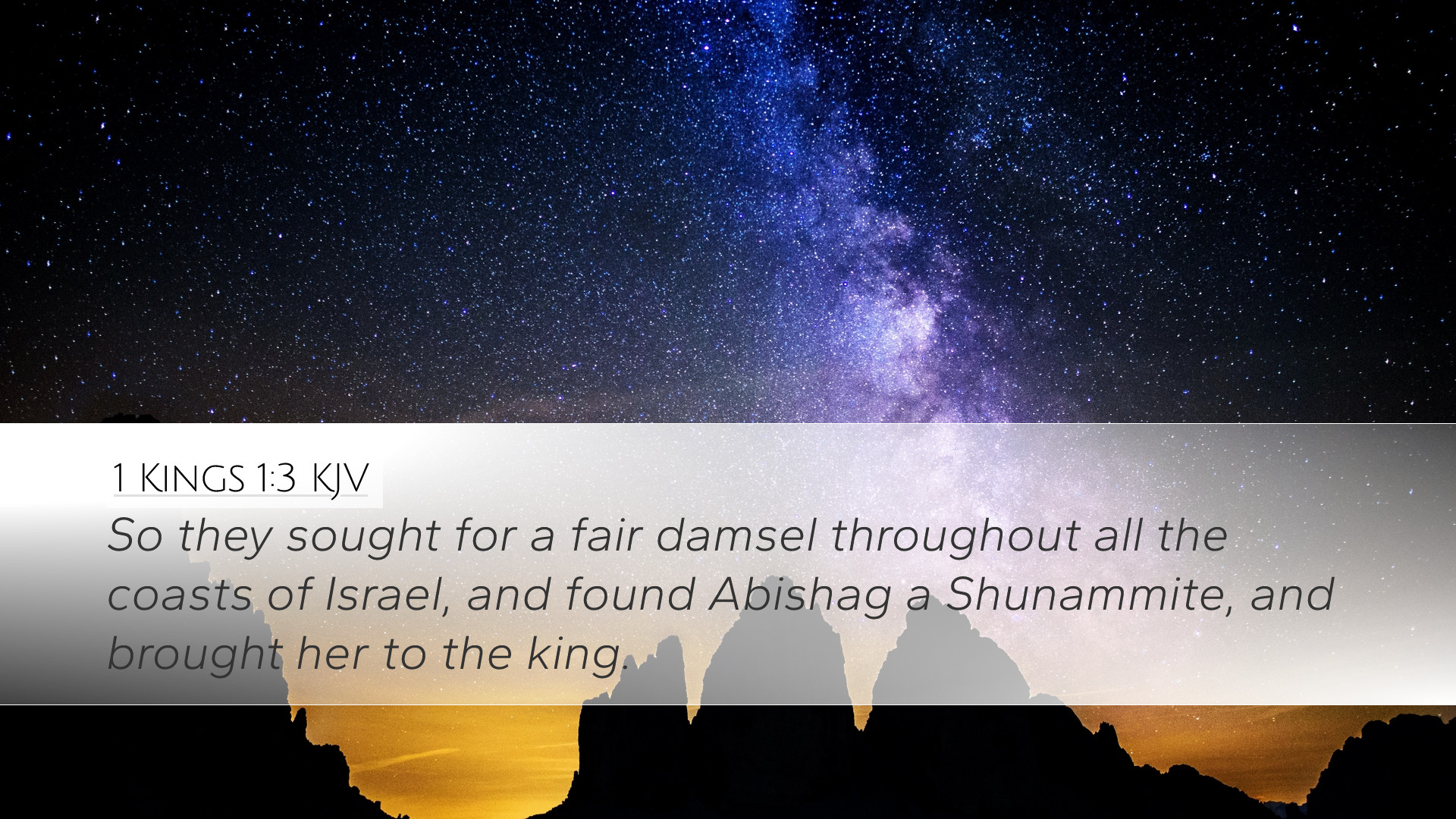Commentary on 1 Kings 1:3
In the context of 1 Kings 1:3, we witness a pivotal moment in the biblical narrative surrounding the transition of power from King David to his successor. This specific verse states:
"So they sought for a beautiful young woman throughout all the territory of Israel, and found Abishag the Shunammite, and brought her to the king."
Contextual Significance
This verse serves as a bridge in the narrative that emphasizes both the physical condition of King David and the political landscape of Israel at the time. It illustrates the cultural practices surrounding monarchy, including the selection of companions for aging kings, and sets the stage for the forthcoming struggle for succession.
Insights from Public Domain Commentaries
Matthew Henry's Commentary
Matthew Henry highlights that David, in his old age, illustrates the frailty of humanity and the need for companionship. David’s condition (his old age and inability to keep warm) reveals not only his physical state but also signifies the decline of his reign. Henry remarks that the choice of Abishag, a young woman, serves dual purposes: it accentuates David’s waning strength and reflects the expectations of royal household obligations.
Albert Barnes' Commentary
Barnes provides insights on the cultural implications of David's need for a “beautiful young woman.” He elaborates on the function of Abishag—being a caregiver as much as a companion. Her role illustrates the societal norms regarding monarchy, wherein a king's personal comfort could be the responsibility of the young women appointed from across the kingdom. Furthermore, Barnes connects this narrative to the overarching theme of God's sovereignty, suggesting that even in David's diminished state, His plan remains intact for the lineage of the Davidic kingship.
Adam Clarke's Commentary
Adam Clarke focuses on the identity of Abishag as the Shunammite. He points out that her selection is significant and carries implications of divine providence. Clarke notes that Shunem is a town affiliated with significant biblical events, suggesting that the choice of Abishag is not arbitrary but rather divinely inspired. This point emphasizes that God's hand is at work in Israel's leadership and succession, despite the human conflict that soon arises.
Theological Reflection
The theological implications of 1 Kings 1:3 extend beyond its immediate narrative. This verse speaks profoundly about humanity’s frailty, the nature of leadership, and God's sovereign oversight in the affairs of men. As David faces his twilight years, his reliance on Abishag symbolizes a universal human need for care, companionship, and support. It manifests the biblical principle that leaders, despite their authority, are vulnerable and in need of others.
Lessons for Today
There are several lessons that contemporary pastors, students, and theologians can derive from this verse:
- Vulnerability of Leadership: Leaders must acknowledge their limitations and embrace support from their community, recognizing the importance of vulnerability.
- Divine Sovereignty: Even in moments of frailty, God’s plan continues to unfold, assuring believers that divine purposes are served through historical events.
- Responsibility of Care: The story exemplifies the need for compassion in community, where providing for the vulnerable is a sacred obligation.
Conclusion
In concluding our exploration of 1 Kings 1:3, it becomes evident that this verse is not merely a detail in the life of King David but a rich tapestry woven with themes of compassion, vulnerability, and divine providence. The insights derived from the public domain commentaries provide a multi-faceted understanding that enriches the text and equips readers—be they pastors, students, or theologians—with valuable reflections and applications for contemporary faith.


